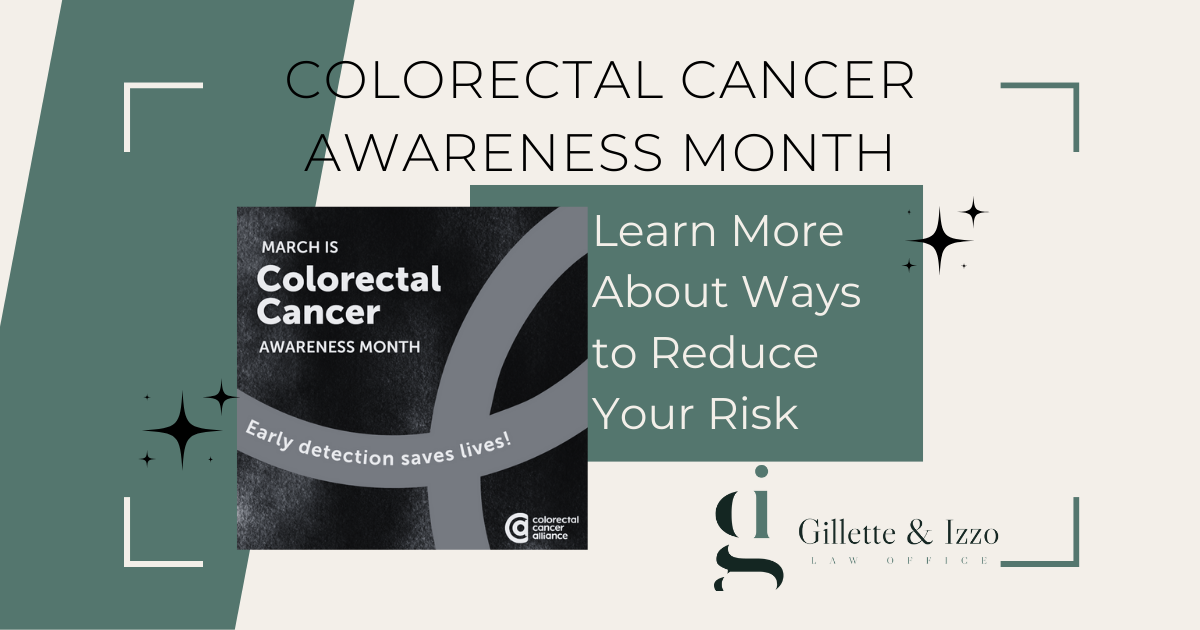2024 marks the second year that March will be recognized as Colorectal Cancer Awareness Month. As the second leading cause of cancer deaths in the US, it impacts a significant number of people throughout the country. While there’s no guaranteed way to prevent this disease, there are steps you can take to address common risk factors.
Symptoms of Colorectal Cancer
Symptoms can take years to appear, and they are not always obvious. The following symptoms may be signs of colorectal cancer:
- Diarrhea
- Constipation
- Blood in stool
- Abdominal pain
- Weakness
- Unintentional weight loss
- Ongoing gas or cramps
- Feeling as though the bowel cannot empty completely
If you are experiencing any change in your bowel habits or other symptoms that you are concerned about, it’s best to contact your doctor.
Regular Screening
Screening may be the most beneficial thing you can do to reduce your risk of developing colorectal cancer. Precancerous polyps can take up to 15 years to turn into colorectal cancer, and routine screening can often spot them early enough so that they can be removed. Plus, colonoscopies are able to detect cancer in its early stages, which will increase the chances of successful treatment.
There are two types of tests for detecting colorectal cancer: stool-based tests and visual exams. Stool-based tests are less invasive but require more frequent testing. Visual exams, like colonoscopies, are completed with an internal scope. Your doctor can help you decide which type of test is right for you. Regular screening is recommended for anyone aged 45 or older. However, if it runs in your family, you may need to be tested younger than that.
Weight and Exercise
Studies have shown that people who are overweight have a higher risk of colorectal cancer, especially men. Always check with your doctor if you have medical conditions that may be impacted by a weight loss program, but for most people, increased exercise is safe when done gradually.
Adding moderate exercise to your everyday routine can be helpful for your overall health and for preventing risk factors for cancer. Limiting the amount of time you spend sitting and lying down is also recommended.
Nutrition
Another risk factor for colorectal cancer is a poor diet. Dependable access to organic produce or healthy snack alternatives can be a challenge, but any improvement is better than none. Whenever possible, the following foods should be kept at a minimum to reduce your risk:
- Beef
- Lamb
- Pork
- Alcohol
- Processed meats
It is also recommended that you eat more of the following foods:
- Garlic
- Berries
- Beans
- Whole grains
- Vegetables
Fiber is believed to be incredibly beneficial for your digestive health and in reducing your risk of developing colorectal cancer.
Smoking and Cancer
Smoking is a risk factor for more than lung cancer. From mouth and throat cancer to stomach and colorectal cancer, smoking has been linked to a whole host of serious and life-threatening illnesses. Quitting smoking should be at the top of everyone’s list when they are working on improving their health.
The American Cancer Society predicts that over 150,000 new colorectal cancer cases will be diagnosed in 2024. Talk to your doctor about getting screened this year.





